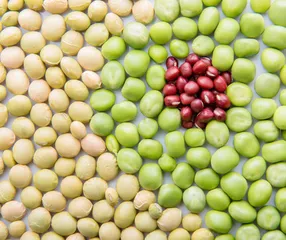Doudou Weight Loss Method Eat and lose weight

How to lose weight after eating? Try the Doudou Diet. Red, yellow, green and black beans all have their own different eating methods. Although they are small, their weight loss effect is not inferior to other weight loss ingredients. Come and give it a try, everyone!
Which do you prefer, red, yellow, green or black? I am greedy and love all four. Although they are small and inconspicuous, they have the effects that girls need. They are a panacea for every woman who strives to lose weight.
So, how should we eat red, yellow, green, and black beans to combine the three effects of weight loss, delicacy and health? Let's start with an in-depth understanding of the weight-loss principles of beans and start our journey of weight-loss beans!
1. red bean
Red beans contain a large number of nutrients, including protein, dietary fiber, carotene, vitamin E, calcium, potassium, magnesium, etc. It has the effects of strengthening the spleen and promoting water, clearing away heat, detoxifying, relaxing the bowels and swelling.
Red bean tangerine peel water
Ingredients: 200 grams of red beans, 5 grams of dried tangerine peel, a little salt.
Method: Soak the red beans and tangerine peel for half an hour, then put the red beans in boiling water and cook for 30 minutes, add the tangerine peel and bake for 10 minutes, and then add a little salt.
Efficacy: Red beans have the effect of promoting water and removing swelling. Orange peel can help digestion and clear the five internal organs. Combined with red beans can lose weight and reduce swelling. It is recommended to drink it every day after meals, and the effect will be seen in 2 weeks.
2. mung bean
Mung beans are rich in calcium, iron, phosphorus and lysine, which can supplement the nutrients consumed in metabolism. They also have the effects of clearing heat and detoxifying, strengthening the stomach and quenching thirst, and dispelling liver fire.
kelp and mung bean paste
Ingredients: half a catty of mung beans, 1 tael of kelp, 1 piece of peel, 100g of rock sugar.
Method: Soak the kelp in water for half an hour, drain it into small pieces. Wash the mung beans and peel, place them together with the seaweed in a pot, add water, and bring to a boil over slow heat. Add rock sugar and serve.
Efficacy: Mung bean can clear heat, eliminate fire and diuretic, while kelp contains crude protein, vitamin A and B2, which can promote gastrointestinal function and strengthen skin elasticity.
3. black beans
Black beans are rich in dietary fiber, which helps improve constipation. They also contain vitamins B1 and E, which can restore physical strength and improve skin condition. They are effective in weight loss and skin beautifying.
DHC Black Bean Tea
Made from Japanese natural black soybeans, brewed with hot water and ready to drink. Rich in nutrients such as cellulose, vitamins, brass and anthocyanins, it can be used as a beautifying and slimming beverage. Soaked black beans can also be eaten directly or cooked.
4. soybean
Soybeans contain hetero-brass and rich protein and calcium, which help lower cholesterol and strengthen bone growth, which has a positive effect on weight loss.
FANCL Germinated Mitong
Made from high-quality germinated rice and soybeans and other grain materials, it is rich in grain fiber, vitamins and minerals. Each piece only contains 19kcal, making it suitable for daily snacks.
Three major benefits of eating beans
1. hyperfibrous defecation
Beans are rich in fiber, can absorb water in the body, turn it into feces together with body waste, and decompose fat and inhibit fat accumulation. Smooth bowel movements can shorten the time food stays in the intestines and reduce absorption.
2. diuretic perspiration
People with edema type obesity often cannot drain water due to accumulated water in the body, which indirectly slows down metabolism. Beans have excellent diuretic and perspiration effects, and can help the body evaporate calories and consume some fat.
3. low-calorie
The calories of beans mainly come from carbohydrates and high-quality soy protein. As long as polysaccharides are not added when cooking, the calories are absolutely not high. The body consumes body fat when it consumes less calories than the body consumes every day.
Tips: Eat less beans if your stomach is not good
Soy products contain a large amount of protein, which can cause indigestion, cause abdominal distension and even diarrhea, and hinder the absorption of iron. Therefore, patients with acute and chronic superficial gastritis should avoid eating soy products. (Internship Editor: Zhang Yutian)